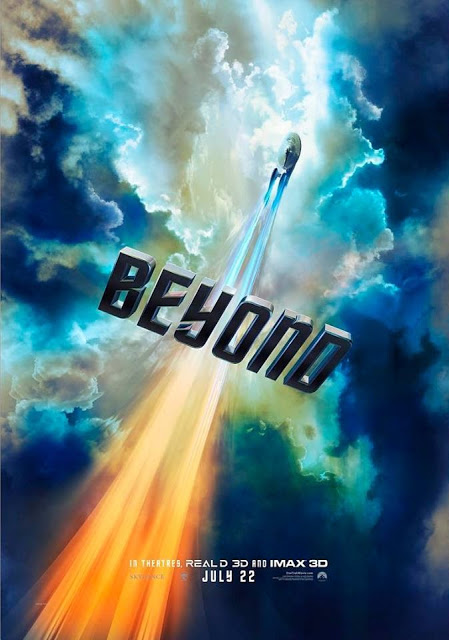Tuesday, August 16, 2016
Star Trek: Beyond (2016)
**Warning: mild spoilers ahead!**
This year marks the 50th anniversary of Star Trek, thus it's appropriate that there is more talk of it in the media than ever before. As well as the ongoing development of the new TV series, Star Trek: Discovery, we have Star Trek: Beyond, the latest in the J.J. Abrams produced Trek films.
The sequel to 2013's Into Darkness begins, interestingly enough, with an ending of sorts. After investigating a seemingly normal distress call in an unknown part of space, the crew of the Enterprise is ambushed by a new and violent force that basically tears the ship to pieces. With no choice but to abandon ship and crash land on the nearby planet, we follow the dangerous journey of the crew, who have now been separated, and are left to locate and each other on a hostile planet. To make matters worse, they are also being hunted by the vicious alien warlord, Krall, who has captured Uhura and Sulu along with several other members of the Enterprise crew. A daring rescue operation is orchestrated, which then turns into a chase that concludes in a climactic action scene on and around the space station Yorktown, where we witness the final battle of Krall and Kirk.
Unlike some other Star Trek films before it, this one leans much more toward action than philosophy. In this sense, it is accessible for newcomers to the series, though people who are interested in more detail of the Star Trek universe might be better to check out the 2009 reboot before getting into this latest offering. The film expects the audience to be up to speed more or less from the get-go, but the action is almost immediate, which leaves little room for explanations outside of some brief snippets of exposition in dialogue.
It is a very exciting movie experience, though there are some flaws. In some scenes, there is simply so much action that it's difficult to make sense of what was happening on the screen. In addition, the general darkness of many scenes as well as the constantly swaying, simulated gravity of the cinematography made some scenes a bit less satisfying than they could have been. My wife and I didn't see this in 3-D, but I feel that's for the best, as the motion of some of the scenes made her feel a bit on the queasy side.
Apart from these minor complaints, Star Trek: Beyond is a very enjoyable film. Prop and production design was top-notch, as it has been with the previous instalments of this series. The makeup design in particular was exceptionally good. Every alien looked properly organic and realistic within the world of the movie. As well, the design of the makeups still allowed for a wide range of expression on the characters, Krall in particular.
The score, by Micheal Giacchino, recalls many classic moments of the original TV series, while still making room for some more original sounds. In addition, a few tracks of modern music (I won't spoil the surprise of their purpose here) add some very interesting contrast to one of the final action scenes.
As this is an action heavy movie, it would be irresponsible of me not to mention the excellent fight choreography and stunt work. There were a great amount of stunts done in this movie, and I have great respect for the individuals who helped make this movie so exciting to watch.
As important as these elements are, a film needs stars, and Beyond is packed with them. Just about every member of the cast gets a moment to shine, all the while keeping a balanced amount of screen time. No one actor seems to overshadow another, which can be a difficult thing to accomplish in a film with such a large cast. If I had to pick any standouts, I would choose Simon Pegg (also a co-writer of the screenplay) as Scotty, who interacted wonderfully with Sofia Boutella as the scrappy alien survivalist Jaylah. There's a clear kinship between them onscreen, and their scenes together are delightful to watch. Acclaimed actor Idris Elba is chillingly ruthless as the warlord Krall. His performance is all the more impressive for communicating such emotion through his elaborate makeup. Finally, it's difficult not to give extra attention to Anton Yelchin as Chekov after his unfortunate death earlier this year. His enthusiastic performance feels somewhat bittersweet in knowing that this was his last film.
Despite a few technical flaws, I came away from this movie excited, wondering what new adventures the crew of the Enterprise will be having in the next film. As I mentioned at the beginning, this could have easily been a much different film, but Star Trek: Beyond clearly defines itself as fun! It's this kind of attitude towards the franchise that will win new fans who have felt alienated by the pseudo-science and long, philosophical conversations of previous films and TV episodes. Make no mistake, science and big ideas have always been the hallmark of Star Trek, but Beyond starts from the same place of excitement the original series did. It makes playful jokes about itself, while still acting out moments that feel pulled straight from the original series. It captures our sense of imagination and adventure, and from this jumping-off point, we can begin to explore the bigger ideas at work. In this film, the great ideals of peace and unity stand out clear as day through the actions of the Enterprise crew. As Gene Rodenberry intended with the original series, witnessing these heroic actions on the big screen inspires us to look beyond, and to aspire to become something greater than ourselves. In times as worrying as these, it's a message I hope people will carry with them outside of the theatre.
Subscribe to:
Post Comments (Atom)

No comments:
Post a Comment